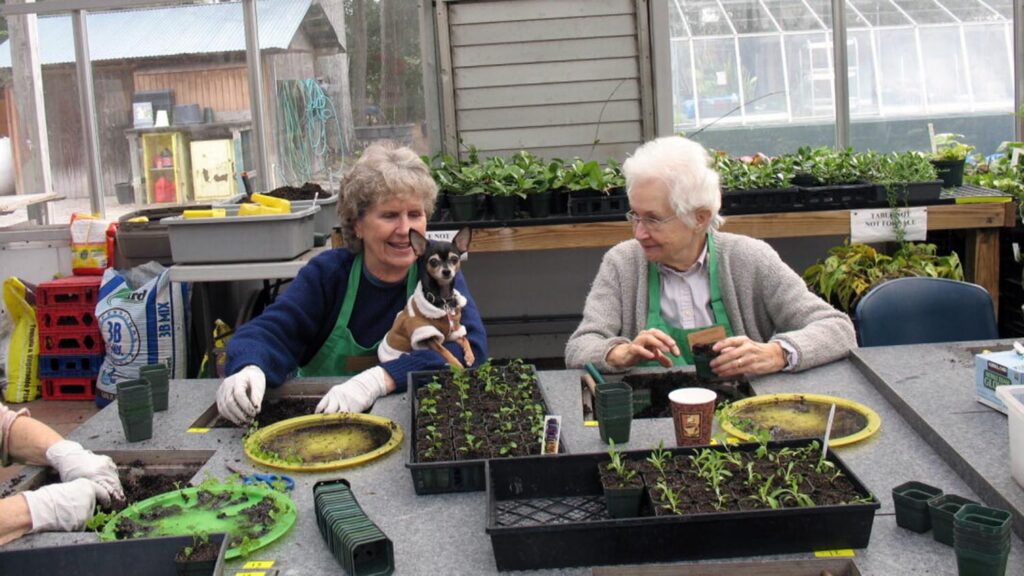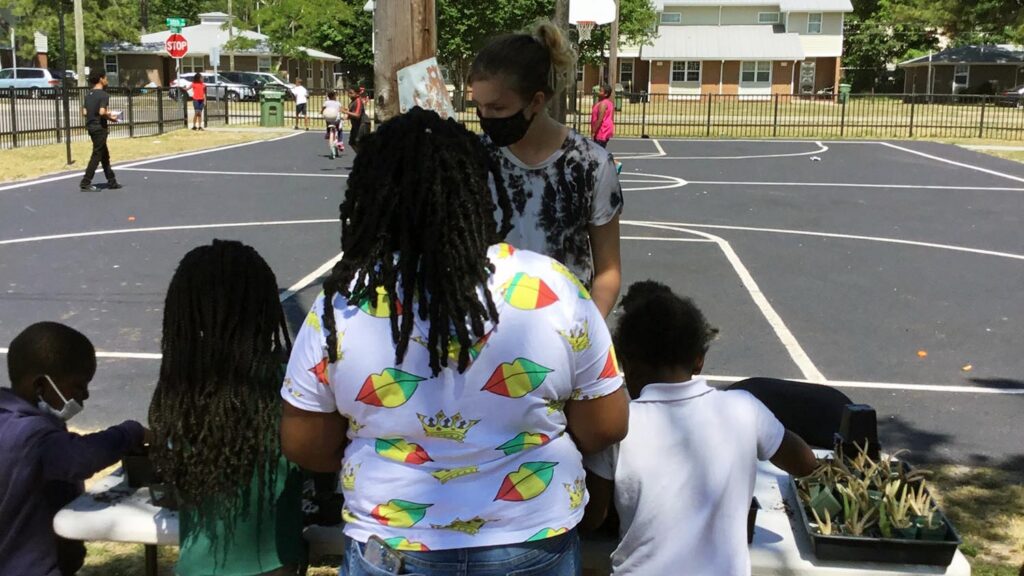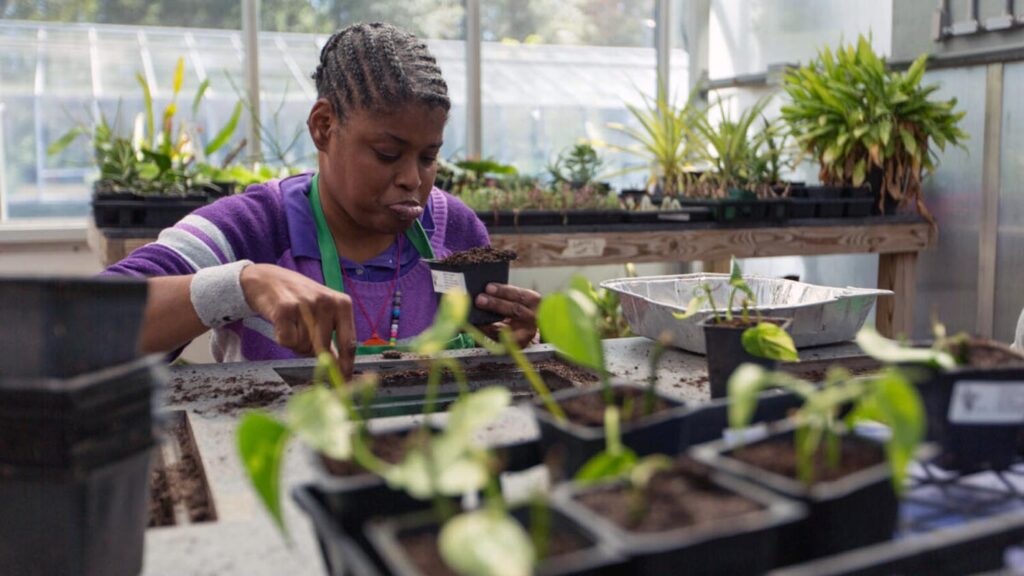An NC State Extension Agent Promotes Nature as a Healer
go.ncsu.edu/readext?1002377
en Español / em Português
El inglés es el idioma de control de esta página. En la medida en que haya algún conflicto entre la traducción al inglés y la traducción, el inglés prevalece.
Al hacer clic en el enlace de traducción se activa un servicio de traducción gratuito para convertir la página al español. Al igual que con cualquier traducción por Internet, la conversión no es sensible al contexto y puede que no traduzca el texto en su significado original. NC State Extension no garantiza la exactitud del texto traducido. Por favor, tenga en cuenta que algunas aplicaciones y/o servicios pueden no funcionar como se espera cuando se traducen.
Português
Inglês é o idioma de controle desta página. Na medida que haja algum conflito entre o texto original em Inglês e a tradução, o Inglês prevalece.
Ao clicar no link de tradução, um serviço gratuito de tradução será ativado para converter a página para o Português. Como em qualquer tradução pela internet, a conversão não é sensivel ao contexto e pode não ocorrer a tradução para o significado orginal. O serviço de Extensão da Carolina do Norte (NC State Extension) não garante a exatidão do texto traduzido. Por favor, observe que algumas funções ou serviços podem não funcionar como esperado após a tradução.
English
English is the controlling language of this page. To the extent there is any conflict between the English text and the translation, English controls.
Clicking on the translation link activates a free translation service to convert the page to Spanish. As with any Internet translation, the conversion is not context-sensitive and may not translate the text to its original meaning. NC State Extension does not guarantee the accuracy of the translated text. Please note that some applications and/or services may not function as expected when translated.
Collapse ▲Success in a typical NC State Extension gardening class might be measured in participants’ knowledge of soil quality, knowing where and when to plant, and reasonable expectations of yield.
In Heather Kelejian’s classes, standards are different. Success can mean merely putting a seed in the ground, a plant in a pot — or simply not throwing dirt on the person next to you.
Kelejian is NC State University’s therapeutic horticulture agent at N.C. Cooperative Extension’s New Hanover County center. She designs garden-based programs for people with behavioral issues, cognitive challenges, emotional trauma, or other disabilities, helping them improve mobility, motor skills, cognitive functions, and physical and mental health.
“I’ve worked with people as young as 3 years old and as old as 95,” she said. “I’ve worked with substance abuse. I’ve worked with veterans. We do a lot of hands-on gardening activities. The programs have something to do with nature, and some type of goal to aim for.”
When she works with youth who have behavioral issues, the goals are specific to a group that tends to have poor impulse control.
“Self control and being able to work on something together is huge,” she said. “One of the best exercises for both of those things is weeding. If you pull a weed and you are supposed to shake the dirt back into the garden, when you are a kid who has regulation control you shake the dirt vigorously. OK, now you’ve shaken dirt all over your friend and your friend is responding negatively. Just that simple task of controlling themselves enough to shake the dirt over a bed with someone beside them and not get it on them is huge. It’s little things like watering without spraying other people. It’s the simplest things.”

NC State Extension agent Heather Kelejian promotes the benefits of gardening through her therapeutic horticulture programs.
Many people garden because of the tangible benefits. Plant in good soil, apply the right amount of fertilizer and water, and anyone can grow food or flowers. While it’s rewarding to grow your own food and enjoy the beauty of a well tended, colorful flower bed, that’s just part of the allure. The simple act of gardening, of planting something, of digging in the dirt while sweating under the sun, is its own reward.
“There’s a lot of research coming out that says gardening reduces blood pressure and reduces anxiety, and about the mental and physical health benefits of being outside,” Kelejian said. “We are supposed to be outside, and our society is disconnecting us from that more and more.”
The therapeutic gardening program extends the benefits of participating in nature to people who might not otherwise have the opportunity, including her students who have been sent to alternative schools with a focus on behavioral interventions.
“There are tons of dollarweed at one of our schools,” she said. “They get into competitions to see who can get the biggest dollarweed root out. Then they will start working in teams on their own. One will be pulling and others will be digging to try to get the root. Their teacher said this is literally the first activity they have done together. Once they have that experience, the teacher is able to say, ‘Remember when we were outside, we were able to do this, let’s do it in the classroom.’”
Some of her work takes place in the field. Much of it takes place at the Extension office inside the New Hanover County Arboretum, at indoor and outdoor gardening classrooms. That’s where another group of older students comes twice a month to learn vocational skills.
“I have a group of 18- to 22-year-olds who are still in the school system who are living with substantial disabilities,” she said. “Right now they are all cognitive disabilities, but sometimes there are physical disabilities as well. They take public transportation from their school to get here. We are preparing them for landscaping jobs.”
The Ability Garden offers several garden-based programs for people with disabilities and those in isolated communities.
“We use all kinds of nature,” Kelejian said. “I do things around composting, around water quality. I talk about trees. We do a lot of hands-on gardening activities. We pot up house plants. I do a lot of sensory stimulation, both with youth and older adults. It’s so adaptable. Anyone can say here’s the goal I’m trying to reach, and there’s a way I can bring a plant or a garden into that.”
Kelejian began working in therapeutic horticulture in 2004. She was an NC State Extension Master Gardener volunteer, and was intrigued by the idea of using nature as a healer. She moved into the role of therapeutic horticulture agent — the only such full-time position in the state — when the original agent retired in 2019.
“I get a lot of requests across Extension because it is such a unique program,” she said. “There is a lot of interest in how we created this program and how we’re able to sustain it. The goal is to eventually establish it in more counties. This program was set up to be a model, so that people can come and learn and start serving whatever targeted population they have. We’re at that point now.”

Some of the therapeutic horticulture activities take place in the community.
Kelejian has designed activity sheets available through NC State Extension that can be used by teachers and others who work with anyone who could benefit from therapeutic horticulture.
“I’ve got a resource portal that teachers can use,” she said. “If you are working with a kid who is autistic and has sensory issues, here is an activity that would help, here’s why, and here’s how you implement it.”
It’s not the career Kelejian envisioned when she earned an English degree from the University of North Carolina. But she was an avid gardener and eagerly agreed when a family member suggested she take an Extension Master Gardener course in New Hanover County — although not just to enhance her knowledge of horticulture.
“I had not been in school for a while and I had young kids,” she said. “I wanted to practice studying before going to grad school. Then I found out about therapeutic horticulture. I had never heard of it. It was immediate. This is what I want to do.”
Kelejian, who is working on a masters in social work, says the program isn’t clinical therapy. Rather, it’s taking research about the emotional and physical benefits of gardening and applying it to different needs.
“There is new research coming out with social work, sociology, eco-therapy,” she said. “The premise is we are all so emotionally and socially stressed right now that we all need some nature therapy. All of us.”
 One of her favorite programs involves helping women who are victims of trauma build a personal connection to nature.
One of her favorite programs involves helping women who are victims of trauma build a personal connection to nature.
“We partner with an organization called A Safe Place,” she said. “The participants are women who have been trafficked. A lot of our programs are focused on an activity. This is more about focusing on the individual and really just sitting in the garden and being with yourself and listening, and allowing that experience to help you find your place after you’ve been through all these really horrific issues.”
There is also a class designed for older adults who have had a stroke and are trying to get mobility back in their arm or hand.
“They go to physical therapy, and they’ll pick an object up, put it down, pick it up, put it down. In the greenhouse they are working on plants, doing the same motions but doing something where they can see a result, a project they’re making. They feel happy and engaged. They feel an accomplishment, instead of just going to physical therapy and doing repetitive things.”
Another program takes place off-site, at one of Wilmington’s public housing communities. Kelejian and other NC State Extension agents put in 15 raised beds, provided plants, and taught residents how to tend the garden.
“It is impacting the whole community,” she said. “It is an area with gang activity and high unemployment. It’s about the residents taking pride in their community rather than us going in there and providing a service for them.”
While many of the therapeutic horticulture activities have physical benefits, all of them are aimed at improving emotional well-being.
“We’re under so much stress and anxiety with everything going on with society,” she said. “This is about showing people all the different ways we can engage in nature. You don’t have to be a Master Gardener volunteer. You don’t have to have a 1-acre garden to reap that benefit. We look for ways you can have that engagement based on your resources, your physical capabilities, and your time. The impacts are almost endless.”

